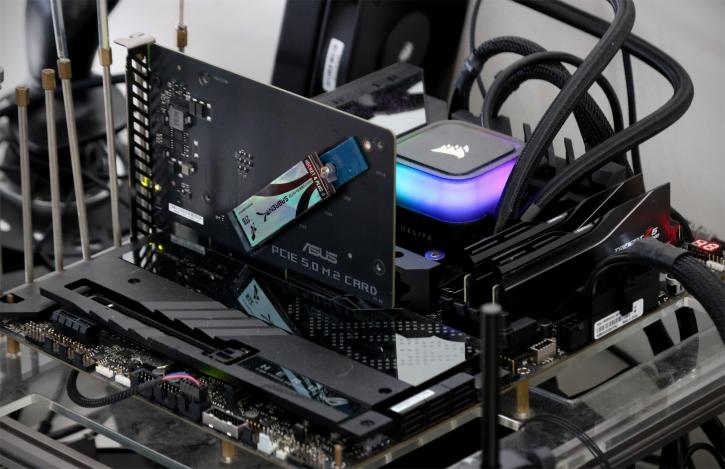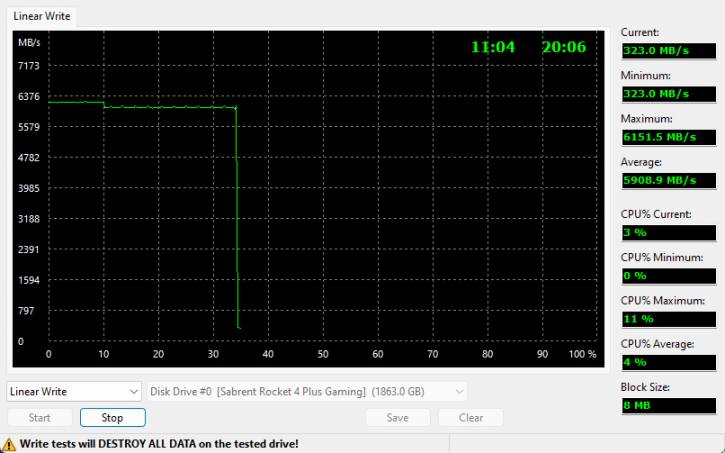Final Words & Conclusion
Final Words & Conclusion
Sabrent has introduced a new high-end PCIe 4.0 SSD named 2TB Sabrent Rocket 4 Plus-G, which features enhanced firmware as compared to the Rocket 4 Plus (really, that's the only difference). Although it is the first DirectStorage-ready drive available in the market, it is not a rebellious product and can perform well in any suitable environment (much like any other high-end NVMe SSD). That said, in this conclusion, we'll discuss a little about relativity because breaching the 7 GB/sec barrier won't always make your gaming PC a lot quicker, and that's a raw act. The good news is that Sabrent is not demanding outrageous pricing for this exceptional product. Yes, this 7 GB/sec NVMe SSD can be spotted for $230, that's ~11 cents per GB. This is a high-performance SSD with TLC writing, a long lifespan, and a 5-year warranty. You'd be hard-pressed not to like this product at that price, wouldn't you?
Platform different. So initially I wanted to these the SSD on a new Ryzen platform. 7950X3D on the ASUS X670E HEro. However, we noticed some performance drops, which makes me wonder, how the SSD would behave on an intel 13900K-based setup. The end result is very different for each platform, both have wins and losses. At trace testing, the Intel platform however wins by a very good margin, and that's what I deem to be the most important test within our test suite. For future SSD testing, we'll probably standardize test results based on the two platforms and thus brands.
Do we really need 7000MBps or faster storage units?
Um no? This is a premium performance product, often synthetically measured, and you'd need serious workloads to get the best out of it. Your PC isn't going to boot faster as your OS is the bottleneck, your PC games might load a fraction of a second faster, your application load up just as quickly as an NVMe SSD with reads/writes in the 2 GB/sec marker. Guys, this is the honest truth. However, the same folk that purchases a GeForce RTX 4090 or Radeon RX 7900 XTX combined with a Core i9 13900KS or Ryzen 9 7950X3D series processor, it's for those guys where that last sniff of performance matters, whether that is realistic or not, I'll leave open to discussion. In retrospect, however, we do have new technologies like DirectStorage. This will allow the graphics card to load textures directly from the SSD bypassing the processor, freeing up processor cycles for other tasks, and speeding up texture load times. In this way, if you have a fast M.2 disk, you will be in the game in less than seconds even on large maps, a negligible time compared to the loading times we are used to today.
Endurance
Sabrent offers 700 TBW (Terabytes Written) for the 1TB model, 1400TBW for the 2TB model. We talked so much about this in the past already, endurance, the number of times NAND cells can be written before they burst and shatter into small pieces (well, they just die and are mapped out, any data present on that cell is written to a healthy one). Bigger volume sizes mean more NAND cells; more NAND cells thus increase endurance. For the 2TB model, you'll get a rated 1400 TBW; the 1 TB model marks 700 TB written. So how long does a 700 TWB storage unit last before NAND flash cells go the way of the dodo? Well, if you are a really extreme user, you might be writing 50 GB per day (normal users likely won't even write that per week), but based on that value, 50GB x 365days= 18.25 TB per year written. So that's over 38 years of usage, double that for the 2TB SSD. And again, writing 50 GB per day is a very enthusiastic value.
Thermals
We know the E18 can get very hot, resulting in thermal throttling under an extreme workload.It is advised to cool it under a heatsink.
Performance
The 2TB Sabrent Rocket 4 Plus-G is basically a Rocket 4 Plus with enhanced firmware., and that is a very fast product. Overall read performance increases from 3GB to well over 6.5 GB/sec. Trace game testing revealed that performance is fast as well. Weirdly enough the product was a notch lower than the PLUS model, we think swapping to the new Ryzen 9 7950X3D platform is responsible for that change. We'll need to investigate though further.
We do want to add the screenshot above. For whatever reason, our AIDA Linear write test did not work on the AMD setup, however on the Intel one it did, the PLUS-G shows it could take a write speed of over 6150 MBps for ~35% of the SSD, that is ~700 GB of continuous writes. That certainly is a different kind of special.
Concluding
In conclusion, the Sabrent Rocket 4 Plus-G is a high-end PCIe 4.0 SSD that comes with enhanced firmware over the plus model, it is available in three storage capacities: 1TB, 2TB, and 4TB. While the performance benefit of the new firmware is hardly noticeable in small file transfers, that may not be apparent in real-world scenarios where the difference between 3GB/sec and 7GB/sec SSDs is negligible. However, the Sabrent Rocket 4 Plus-G is the first DirectStorage-ready drive on the market, which is where it will matter in the future. Then again, we doubt it'll make much difference compared to other premium NVMe PCIe Gen 4.0 SSD drives. The SSD supports the NVMe 1.4 standard and has a five-year warranty, has super nice endurance, please do combine it with heatsink (that prevents thermal throttling). To maximize its performance, users will need a PCIe Gen 4 infrastructure, of course. The Sabrent Rocket 4 Plus-G is a solid product with great performance, a reasonable price point, and a nice warranty. It does feel a bit like a marketing release taking in the hype and momentum as first DirectStorage-ready drive.
Update: shortly after writing this article, pricing changed. You can pick up the 2TB model for $230, that's 11 cents per GB. That makes this SSD a steal. The 1 TB model sells at $120
Recommended Downloads



